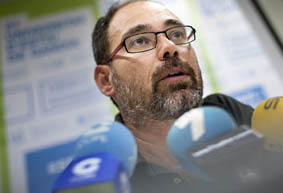
‘América Latina entre el Neoliberalismo y el Socialismo’ and ‘Del Cine Social a la Sociedad Filmada’ (‘Latin American between Neoliberalism and Socialism’ and ‘From social cinema to the filmed society’) are the two new courses inaugurated in the 31st Summer University of Gandia. Alberto Montero, Professor of Applied Economics in the University of Malaga and Francesc Hernandez Dobon, from the Institute of Educational Creativity and Innovation of the University of Valencia have both offered conferences.
Alberto Montero, professor of Applied Economics in the University of Malaga, participated last Tuesday in the course ‘Latin America between Neoliberalism and Socialism’, where he talked about ‘economics and social politics in the ALBA countries’. Within his intervention, professor Montero has tried to expose the evolution undergone by the ALBA countries and to analyze their economic and social politics to define their current situation and how they can alter the subcontinent’s geopolitics. It is a way of analyzing what could happen in Latin American in a ‘post-Chavez’ era, taking into account the basic initial politics and how they are developing.
Professor Montero has also referred to Bolivia as ‘a country that has an interesting equilibrium between macroeconomics and social politics which try to cope with the demand and productive capacity to avoid an increase of importations and a deterioration of the scale’.
Comparing the blocs, the professor suggests that ‘we are in a situation where macroeconomic politics are pretty similar to those of the ALBA countries and the countries of the Pacific Alliance, but the difference is that all ALBA countries are tinged by social politics and in the Pacific bloc they are not. Social politics like the fight for alphabetization: schooling is motivated with school canteens avoiding kids to be a burden for their parents; sanitary assistance politics; and other try to improve the citizens’ lifestyle.
Referring to the integration of ALBA countries, professor Montero has affirmed that ‘it is very probable that it will develop towards disintegration because although Chaves was the main ALBA driver, Venezuela’s current situation requires Nicolas Maduro’s complete attention, which impedes him from attending other aspects’.
From Social Cinema to the Filmed Society
On the other hand, the secretary of the Institute of Educational Creativity and Innovation of the University of Valencia, Francesc Hernandez Dobon, also participated in the press conference to talk about ‘Social Cinema and the fight for recognition’, which he has shared within the course ‘From Social Cinema to the Filmed Society’, coordinated by Ricard Huerta.
Francesc Hernandez has set out the general lines of his intervention in which he stablished that ‘cinema nowadays is not an extraordinary event to contemplate one day in a village, but rather it is more present in the screen due to the new possibilities that technological innovation offers. And even though cinema is always fiction, it is a way of showing our own reality’. Hernandez Dobón has used psychiatry as an example: ‘through cinema we have constructed an image for some specific pathologies; he have created, for example, a profile for serial killers or it has transmitted us determined behaviors’; and history: ‘Cinema has helped us to come closer to some specific historic moments’, he said.
Regarding social cinema, Hernandez Dobon has stated that nowadays ‘we are facing the surging of a new cinema thanks to the success of some series with a significant impact that shows social realities and affect our vision of society, history and human relationships’. As indicated by professor Dobon, ‘this innovation has taken place in the USA where scriptwriters have absolute creative freedom and can afford to disturb the audience as they do not depend on financing. Within the Spanish State, the main film producers are television chains and do not deal with sensible topics that could disturb the audience. The cinema world has schizophrenia between what is produced and what is seen, and the creators must have more freedom of creation, there is a reflection of social conflicts but a general normalization where television channels must stimulate the industry is needed. There is no presence of series with creative freedom’.
Francesc Hernandez has taken advantage of the occasion to talk about Canal 9 (Valencian regional television) whose closure ‘has greatly affected Valencian society; not only its industry and labor activity but it has also influenced cultural and linguistic factors. Its closure has had an economic and formative impact because necessity of audiovisual products has not been generated’.
Last update: 23 de july de 2014 12:30.
News release


















